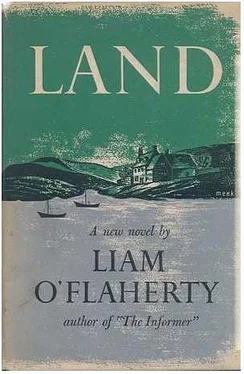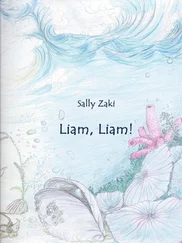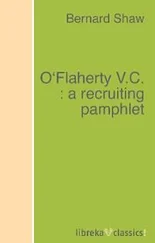Liam O'Flaherty - Land
Здесь есть возможность читать онлайн «Liam O'Flaherty - Land» весь текст электронной книги совершенно бесплатно (целиком полную версию без сокращений). В некоторых случаях можно слушать аудио, скачать через торрент в формате fb2 и присутствует краткое содержание. Город: London, Год выпуска: 2011, ISBN: 2011, Издательство: Bloomsbury Publishing, Жанр: Проза, на английском языке. Описание произведения, (предисловие) а так же отзывы посетителей доступны на портале библиотеки ЛибКат.
- Название:Land
- Автор:
- Издательство:Bloomsbury Publishing
- Жанр:
- Год:2011
- Город:London
- ISBN:9781448203888
- Рейтинг книги:3 / 5. Голосов: 1
-
Избранное:Добавить в избранное
- Отзывы:
-
Ваша оценка:
- 60
- 1
- 2
- 3
- 4
- 5
Land: краткое содержание, описание и аннотация
Предлагаем к чтению аннотацию, описание, краткое содержание или предисловие (зависит от того, что написал сам автор книги «Land»). Если вы не нашли необходимую информацию о книге — напишите в комментариях, мы постараемся отыскать её.
Land — читать онлайн бесплатно полную книгу (весь текст) целиком
Ниже представлен текст книги, разбитый по страницам. Система сохранения места последней прочитанной страницы, позволяет с удобством читать онлайн бесплатно книгу «Land», без необходимости каждый раз заново искать на чём Вы остановились. Поставьте закладку, и сможете в любой момент перейти на страницу, на которой закончили чтение.
Интервал:
Закладка:
“Did Stapleton tell you that Neville is away?” Barbara said in a very casual tone as he approached.
“I already knew,” Fenton said as he bowed over her hand.
“Oh!” Barbara said, turning her eyes once more in the direction of the stables.
“Captain Butcher called on me last night,” Fenton said.
“Do sit down,” Barbara said without looking at him.
Sobered by the sharp gallop from Clash, the District Inspector now felt acutely sorry that he had come.
“What on earth led me to suppose that she would be sympathetic?” he asked himself. “I know she despises me.”
In fact, Barbara did not seem inclined to pay any further attention to her guest after her first few bored remarks. She continued listening to the song in unconcealed rapture. The silence became so painful for Fenton that he finally asked her the identity of the singer, simply in order to make conversation. Barbara responded at once.
“It’s Andrew Fitzgerald, the new groom,” she said, taking a chair opposite Fenton and smiling radiantly. “His voice has a rare quality. Don’t you think so?”
Fenton pretended to listen to the song for a few moments with attention. It was a Gaelic love-song, rendered with passion in a tenor voice. He felt that it lacked any of the rare quality that Barbara professed to find in it.
“He’s very good,” he said politely. “Fitzgerald, did you say?”
“He came last week to take Murphy’s place,” Barbara said. “Poor Murphy got frightened during the attack on my husband. He has run away. It seems that one of the bullets grazed his neck and he couldn’t sleep as a result. Then last week he saw Michael O’Dwyer, whom everybody says is the culprit, down at the pier. That was too much for him. He bolted that night.”
The butler came into the room with wine and whisky on a tray, just as the groom reached the climax of his song. As he took some whisky, Fenton noted with displeasure that Barbara made no attempt to conceal from the butler her passionate absorption in the groom’s wild cry of love.
“I hope you forgive my coming,” Fenton said after the butler had gone.
Barbara did not reply for a few moments. She seemed to be recovering slowly from the hypnotic effects of the song that had just ended. She shuddered slightly before turning to Fenton.
“I’m glad you came,” she said without feeling. “You say Neville came to see you last night. Did he, by any chance, tell you where he was going?”
“Not exactly,” Fenton said in surprise.
Barbara laughed and toyed with her necklace.
“You must think it very odd that I should ask such a question,” she said gaily, “but that is how things are in this house lately. Neville has become most secretive. He trusts nobody. Indeed, I feel that his bloodhound is the only creature in which he has any confidence. Life has become insufferable. It really has. I hope you don’t think it disloyal of me to say such things.”
“Not in the least,” Fenton said.
“If only the criminal were caught and brought to justice,” Barbara continued, “we might have peace.”
“It’s very difficult,” Fenton said, crossing his legs. “We have no evidence. If we attempted to secure a conviction and failed, especially in view of the popular ferment, there might be a grave danger of making the man a martyr and a hero. The Government very definitely does not want to provide the rebels with any more martyrs than it can possibly help.”
“It all sounds insane,” Barbara said.
“Very unpleasant business, I admit,” Fenton said.
“Neville is planning something,” Barbara said. “He always reacts violently when attacked.”
“Your husband has gone to Dublin,” Fenton said in a sombre tone.
“Oh!” said Barbara. “To Dublin? Is it to see Lord Mongoole about those tenants that are to be evicted?”
“The evictions are possibly one of the reasons that took him to Dublin,” said Fenton, “but not the main reason. He called on me last night about a much more serious matter.”
Barbara wrinkled her forehead and examined Fenton’s face critically.
“You have something unpleasant to say,” she said in a tone of annoyance.
“There are many things I want to tell you,” Fenton said. “Some of them, no doubt, you may find unpleasant. Others, I am bold enough to hope, might not be altogether …”
He broke off in confusion, blushing to the roots of his hair.
“Sometimes I have the feeling that I am living in a lunatic asylum,” Barbara said. “It really is beastly, living in a state of permanent fear, among people by whom one is permanently hated. Why can’t we ever behave decently towards the Irish? We have tortured this charming and talented people for hundreds of years. It’s outrageous.”
“I profoundly disagree,” Fenton said passionately.
Barbara looked at him with disgust.
“How odd!” she said.
“I loathe both the country and the people,” Fenton said with remarkable intensity. “I’d give a great deal to be away from here. Unfortunately, I’m a poor man. I can’t afford to resign.”
He flushed, looked at Barbara suddenly and then drank all the whisky in his glass.
“How very odd!” Barbara said. “I felt certain that you were a sensitive person.”
“The trouble is that I’m too sensitive,” Fenton said in an injured tone.
“Not in the way I understand the word,” Barbara said contemptuously.
Fenton became truculent as the whisky made him intoxicated once more.
“It’s because I am sensitive beyond the ordinary,” he said, “that I suffer so much from having to live here. The others simply drink and gamble. They stupefy themselves. However, I didn’t come here to talk of that sort of thing. I wanted to tell you …”
“I feel sure that I’m not going to like what you have to say,” Barbara interrupted. “I’ve changed my mind lately about many things. May I have some sherry?”
When he rose, Fenton was shocked to discover that he was completely drunk. He had considerable difficulty in getting Barbara her wine. Yet he refilled his own glass before returning to his seat.
“When I met you first,” Barbara said after tasting the sherry, “I had an idea that you were sensitive to injustice, that it revolted you and that you held yourself apart for that reason, realising that you were being forced to live in a lie. Apparently I was wrong. You evidently have no sympathy with those who suffer injustice.”
Fenton tried to retort, but failed to find anything suitable. He put his fingers inside the collar of his uniform and tugged nervously several times, trying to relieve the developing constriction at the base of his throat. Then he suddenly thought of a retort.
“Last time I was here,” he cried in a tone of indignation, “you yourself said that you found the people stupid and cruel.”
“Surely not,” Barbara said. “Even then, my views had already begun to change.”
“I distinctly remember your saying so,” Fenton said in a tone of mean triumph.
“Oh! I remember now,” Barbara said. “I was referring to Major Fitzwilliam and the others. It’s quite true that the local gentry bore me. They bore me terribly. The people to whom I now refer are those whom the parson loves to call ‘the natives.’ He says it in such a peculiar way, barely opening his lips, as if they were too indecent for mention in polite society.”
“You surprise me,” Fenton said.
“Neville’s attitude towards them is slightly different,” Barbara continued. “He thinks of them as domestic animals, some good for being soldiers, others for various kinds of manual labour.”
“You surprise me very much,” Fenton said.
“I hoped that I wouldn’t surprise you,” Barbara said, “when I met you first. You seemed so different from the others. I thought we might become friends. I was very lonely and …”
Читать дальшеИнтервал:
Закладка:
Похожие книги на «Land»
Представляем Вашему вниманию похожие книги на «Land» списком для выбора. Мы отобрали схожую по названию и смыслу литературу в надежде предоставить читателям больше вариантов отыскать новые, интересные, ещё непрочитанные произведения.
Обсуждение, отзывы о книге «Land» и просто собственные мнения читателей. Оставьте ваши комментарии, напишите, что Вы думаете о произведении, его смысле или главных героях. Укажите что конкретно понравилось, а что нет, и почему Вы так считаете.












